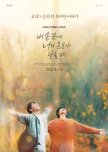This review may contain spoilers
A Heartwarming Reunion with a Nostalgic Charm
The Time of Fever (also known as When I Feel Your Warmth) is a tender, emotionally charged South Korean BL series that serves as a prequel to Unintentional Love Story, exploring the formative student years of Hotae and Donghee. The series captures the tension and complexity of their friendship, which begins to transform after years apart, as Hotae returns to his hometown to live with Donghee. What begins as a brotherly bond evolves into something deeper and more complicated, as both wrestle with newfound feelings.
The plot is straightforward, without unnecessary subplots, allowing the delicate dynamics between Hotae and Donghee to take center stage. The story is not new, but its fresh delivery gives it a refreshing charm. As a spin-off, it complements Unintentional Love Story beautifully by offering a glimpse into the backstory that led to the original drama’s events. Donghee’s quiet longing and Hotae’s gradual realisation of his own feelings are portrayed with an intimacy that feels raw and real.
The cinematography is stunning, with bright yet blurred colours, and the sound design is exceptional, often mimicking the heightened senses of the characters. The attention to detail—like Donghee noticing Hotae’s breath or the tactile tension of a hand on a shoulder—heightens the emotional weight of each scene. The music choices only serve to amplify this atmosphere, drawing viewers into the world of the two leads.
What stands out most is the chemistry between Won Tae-min and Do Woo, reprising their roles from Unintentional Love Story. Their interactions are packed with yearning gazes, subtle gestures, and a palpable connection that carries the show. It feels light and avoids unnecessary melodrama, giving it a natural, lived-in quality.
The tension between Hotae and Donghee is both heart-wrenching and electric. There’s a strong sense of longing, not only for each other but also for clarity in their emotions. The subtle chaos of their relationship—often conveyed through ambiguous dialogue—mirrors the uncertainty they feel internally. The series encapsulates the confusion, curiosity, and fear that often come with young queer love, making it incredibly relatable.
If there’s one thing I would have loved, it’s a final episode showing us what happens years later, after the events of Unintentional Love Story. But as it stands, The Time of Fever is a touching, beautifully told story that left me both satisfied and yearning for more.
The series is a must-watch for fans of the original, and it serves as an emotional prequel that adds new layers of meaning to the relationship between Hotae and Donghee. Rewatch value? Absolutely!
The plot is straightforward, without unnecessary subplots, allowing the delicate dynamics between Hotae and Donghee to take center stage. The story is not new, but its fresh delivery gives it a refreshing charm. As a spin-off, it complements Unintentional Love Story beautifully by offering a glimpse into the backstory that led to the original drama’s events. Donghee’s quiet longing and Hotae’s gradual realisation of his own feelings are portrayed with an intimacy that feels raw and real.
The cinematography is stunning, with bright yet blurred colours, and the sound design is exceptional, often mimicking the heightened senses of the characters. The attention to detail—like Donghee noticing Hotae’s breath or the tactile tension of a hand on a shoulder—heightens the emotional weight of each scene. The music choices only serve to amplify this atmosphere, drawing viewers into the world of the two leads.
What stands out most is the chemistry between Won Tae-min and Do Woo, reprising their roles from Unintentional Love Story. Their interactions are packed with yearning gazes, subtle gestures, and a palpable connection that carries the show. It feels light and avoids unnecessary melodrama, giving it a natural, lived-in quality.
The tension between Hotae and Donghee is both heart-wrenching and electric. There’s a strong sense of longing, not only for each other but also for clarity in their emotions. The subtle chaos of their relationship—often conveyed through ambiguous dialogue—mirrors the uncertainty they feel internally. The series encapsulates the confusion, curiosity, and fear that often come with young queer love, making it incredibly relatable.
If there’s one thing I would have loved, it’s a final episode showing us what happens years later, after the events of Unintentional Love Story. But as it stands, The Time of Fever is a touching, beautifully told story that left me both satisfied and yearning for more.
The series is a must-watch for fans of the original, and it serves as an emotional prequel that adds new layers of meaning to the relationship between Hotae and Donghee. Rewatch value? Absolutely!
Was this review helpful to you?





